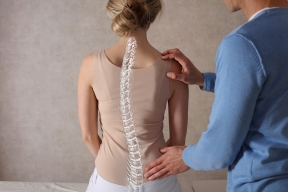Adolescents with Scoliosis: Diagnosis and Treatment
By Dr. Albert Gilpin, Jr.
McLeod Pediatrics Orthopaedics
Scoliosis is a condition that causes a sideways curvature of the spine. Affecting an estimated 6 to 9 million people in the United States, scoliosis can develop in infancy or early childhood; however, the primary age of onset for scoliosis is 10 to 15 years of age, occurring equally among both males and females.
Different Forms of Scoliosis
The most common form of scoliosis is “idiopathic.” This is the term doctors use to describe a disease that has no obvious cause; therefore, it simply means there isn’t one specific factor that caused the scoliosis to develop. Most researchers believe scoliosis is a multifactorial disease with many different potential aspects that influence its development and progression.
When scoliosis results from a defect in the spine that was present at birth, it is called “congenital.” Other types of scoliosis arise from diseases such as cerebral palsy (neuromuscular scoliosis) or accidents (traumatic scoliosis).
How Scoliosis Affects the Patient
Most children and teens with mild scoliosis do not have symptoms or pain. Sometimes, the child, teen, or a family member may notice changes in posture, which may be a sign of scoliosis. Other signs may include the following:
- The top of the shoulders are uneven.
- One shoulder blade (in the upper back) is more prominent or visible than the other.
- One hip appears higher than the other.
- One side of the rib cage is higher than the other when bending forward.
- If the scoliosis is progressing and the curve is more severe, the changes in the shape of the spine can lead to back pain.
Meanwhile, severe scoliosis impacts the patient’s quality of life, putting pressure on the heart, diminishing lung capacity, and limiting physical activity. Thankfully, through early detection and treatment advances, the worst effects of scoliosis may be prevented.
Non-Surgical Treatment for Scoliosis
An orthopedic spine, neck, and back specialist will recommend the best course of treatment for the patient. The severity and location of the spinal curve, the patient’s age, the potential for further growth, and the patient’s general health all must be taken into account when choosing how to treat this condition.
A mild curvature (up to 20 degrees) generally requires simple periodic medical observation to watch for signs of further scoliosis progression. For children and adolescents with curves of 25-40 degrees, wearing a back brace is the usual treatment. Most braces are plastic and constructed to conform to your child’s body. The brace should be worn until your child’s bones complete their development. Often, sports and regular activities are not affected by the use of a brace.
Surgery is only recommended for curvatures that have become progressively worse or in cases where nonsurgical treatments were unsuccessful and pain still persists. When discs have severely degenerated, spinal fusion may be required.
The length of the recovery following surgery is dependent on how extensive the surgery was and the age of the patient. Some patients will be back to full activity in three months, and some patients may need as long as six to nine months to properly heal.
Contact an orthopedic surgeon if you have concerns about scoliosis and your child.
-
McLEOD REGIONAL MEDICAL CENTER FLORENCE
843-777-2000 -
McLEOD DARLINGTON
843-777-1100 -
McLEOD DILLON
843-774-4111 -
McLEOD LORIS
843-716-7000 -
McLEOD SEACOAST
843-390-8100 -
McLEOD CHERAW
843-537-7881 -
McLEOD CLARENDON
803-433-3000



-
McLEOD REGIONAL MEDICAL CENTER FLORENCE
843-777-2000 -
McLEOD DARLINGTON
843-777-1100 -
McLEOD DILLON
843-774-4111 -
McLEOD LORIS
843-716-7000 -
McLEOD SEACOAST
843-390-8100 -
McLEOD CHERAW
843-537-7881 -
McLEOD CLARENDON
803-433-3000
 Find a Doctor
Find a Doctor  Locations
Locations  Services
Services 